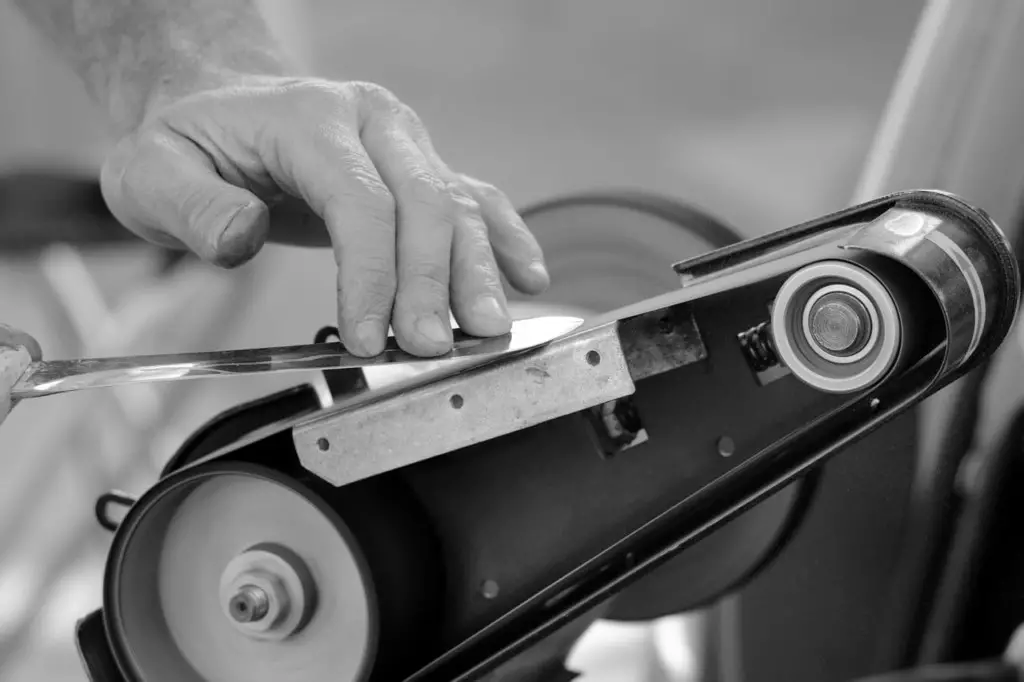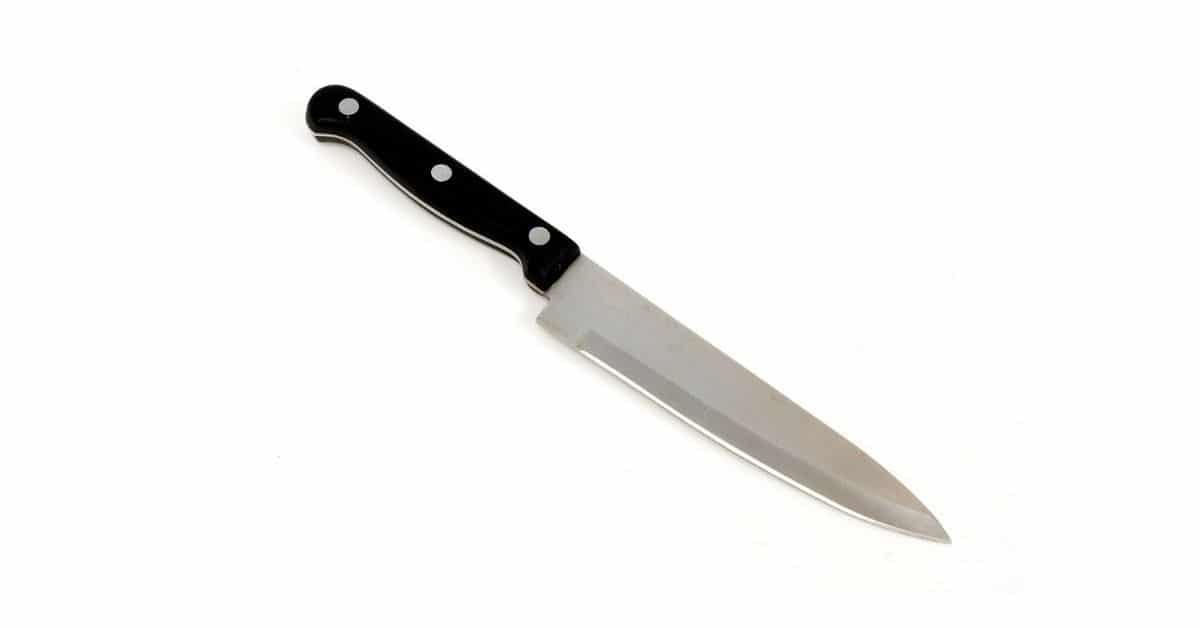Buying a new knife is exciting. However, when it becomes dull fast, you’ll get discouraged. I’ve been there, and I know how it feels. That said, if your blade becomes blunt, you’re doing something wrong. Hence I’ve created this article. So you know how to prevent such scenarios from occurring ever again.
A knife may become dull for many reasons, such as improper storing, low-quality materials, or using an unsuitable technique. Thus honing your blades is crucial for keeping them sharp. For instance, various knives require you to sharpen them at least once a month, if not more often.
That said, buying a high-quality knife will prevent most of the trouble. Yet, some experience blades becoming blunt after a short period. Well, there are many reasons why that might happen. If you follow each one and ensure you’re not making them, your knives will stay sharp for a lengthy period.
Why do knives become dull?
From my experience, some don’t expect their blades to become blunt. As a result, when it does happen, and it will, they’ll get discouraged. Yet, individuals who take care of their knives will have a sharp one for a lengthier period.
When you’re using your knife to cut objects, these objects will stick to the knife’s blade. Because of that, it’ll become less sharp over time. As a result, you may find it more difficult to cut smoothly. When you sharpen your knife, you remove these materials from the blade, making it sharp.
Because of that, you shouldn’t get frustrated when your blade becomes dull; it’s completely natural.
Instead, ensure you take care of your knife regularly. That way, you’ll be able to enjoy the quality of your knife to a more extended level. In addition, if you bought an expensive knife, you’ll want to get your return. If you maintain it properly, you’ll do just that.
Furthermore, there are distinct instances that can speed up the process of bluntness. Consequently, the blade will become unusable faster, making them lose value.
The reasons why your knife gets dull quickly are the following.
- The knife is low quality.
- Using improper technique.
- Storing the blades incorrectly.
- Not honing your blades.
- Poor maintenance.
- Sharpening them too frequently.
Following that, I’ll present the common mistakes people make when getting their blades dull. That way, you can follow along and ensure you’re avoiding them in the future.
Before we continue, if you’re interested in buying a sharpener, I highly encourage you to follow the link to an article of mine on the best knife sharpeners for your money.
The knife is low quality.
Some people don’t want to spend plenty of money on a knife. While that’s completely understandable, you should understand the consequences.
A knife that’s from lower-quality materials will become dull more quickly. Because they’re not as durable as higher-quality ones, using them will wear them off more rapidly. As a result, lower-quality knives will wear off more quickly, thus becoming dull more often.
Because of that, if you’re interested in investing money long-term, I highly encourage you to consider buying a high-quality knife. Not only will it wear off less frequently, but it’ll also provide more sharpness. As a result, you’ll enjoy the experience better.
Using improper technique.
To understand that point, we must go back. Why do knives become dull? Because when we’re using them, the material sticks to the blade, making it less sharp. Because of that, when we’re cutting, we want to use the proper technique.
When using a knife, the material’s particles stick to the blade. Because the particles block the knife from cutting an object, it’ll function more poorly. As a result, if you’re using improper technique, more particles will stick to the blade, thus making it blunt often.
To overcome this, check out this YouTube video explaining the correct technique. That way, you’ll be able to mimic that and ensure you’re not making your blades blunt frequently.
Storing them improperly.
Many factors determine whether your knife becomes blunt. Bashing one into a solid object, for instance, will decrease one’s sharpness. As a result, your knife will become dull more quickly. Another factor is storing it mistakenly.
Storing your knife anywhere but a dedicated spot for it will ultimately lead to it becoming dull faster. As a result, placing your blades at a location where they won’t bash into each other or stay wet will keep them sharp for a lengthier period, hence keeping their value.
Additionally, you want to dedicate a spot for your blades to rest. Such a location must be soft and ensure they’re dry after you hand-washed them.
I highly recommend you purchase a standard knife holder. Check out this Magnetic wooden kitchen knife holder on Amazon. I encourage you to buy it so you can keep your blades as sharp as ever.
Not honing your blades.
Some people don’t know the difference between honing and sharpening a knife. Therefore, they won’t bother looking into it to maintain their blades correctly. Overall, understanding the differences between the two will assist you in properly maintaining your blades to be as sharp as ever.
When honing your knife, you align the blade; so it’s in the proper position to cut objects. Doing it is remarkably crucial for when you’re looking to maintain it properly. For instance, experts recommend you hone a blade after 2-4 prolonged uses. That way, you’ll keep it consistently sharp.
For that reason, I highly encourage you to look into buying a honing tool. Not only will it assist you in maintaining your knife correctly, but it’ll also make it sharper than before. That way, you’ll have positive experiences using it.
Furthermore, buying a high-quality honing tool will provide a complete experience. Because of that, check out this honing steel tool by TUO. (Amazon)
Sharpening them too often.
To fully understand this point, we need to check what sharpening causes. When we make our blades sharper, we essentially remove material from the blade itself. As time goes on, removing parts of the knife is typical. Because of that, the tool won’t be as sharp as before.
When you sharpen your knives too often, you’ll notice a steady decrease in overall sharpness. After some time, the blade becomes unusable for various uses. Consequently, you’ll experience the tool wearing off, making it lose value over time.
Because of that, often sharpening your knives will ultimately ruin its blade. Hence consider sharpening your knives suitably.
I wrote an entire article on how often you should sharpen your knife. To avoid oversharpening your blades, check it out.
Not maintaining them properly.
Keeping a standard for maintaining your knives is crucial in keeping them sharp. Yet, many people make plenty of mistakes in just that. To overcome this, ensuring you’re familiar with the ways to avoid your knife from becoming dull is vital.
Bad storing, sharpening too often, not honing, and using improper technique, are all improper maintenance habits for your knives. Because all of these will cause bluntness, your blades won’t be as sharp as they’re capable of being, hence not usable.
As a result, if you’re making one of the mistakes I listed in this article, you won’t see positive results from your tools. Instead, following these will ensure you notice the benefits of having a sharp blade grants.
That way, your skills in using the knife will increase without you noticing. Having high-quality knives will ensure you’re capable of using the blade to its full potential.
What are the consequences of owning a dull knife?
When we think with common sense, what’s going to cut you deeper, a sharp knife or a dull one? Obviously a dull one. Or is it not true?
Well, to be accurate, it’s not entirely true. Instead, most injuries with a knife occur when the blade isn’t sharp. As a result, the individual ends up cutting himself.
As a general rule, using a dull knife increases the chance of injuring yourself. The amount of pressure you need to apply on a blunt blade is higher than a sharp one. As a result, the knife is more likely to slip from the object onto your hand. Although it’s against common sense, that’s the case.
Additionally, if you own a knife for self-defense purposes, knowing your blade is capable of causing damage is crucial. That way, you’ll be more confident and be able to use it efficiently.
Otherwise, you’ll have a blunt weapon in your pocket, unready to do anything. As we know, we carry a pocket knife to ensure we’re capable of handling threatening situations. With a dull blade, we’re not effective. Hence we’re better off not carrying anything.
Before we continue, if you’re worried about injuring yourself using a knife, an article I wrote tells you why a dull knife is dangerous and how to check if your blade is sharp.
Lastly, having a non-sharp knife will decrease your skills. If you like to cook, you’ll have a more challenging time cutting food. As a result, the quality of your dishes will decrease.
According to a study, Blade sharpness affect grip forces, cutting moments, and cutting time, with sharper blades requiring statistically significantly lower peak and mean cutting moments and grip forces than dull knives. (Cutting moments and grip forces in meat cutting operations and the effect of knife sharpness)
Thus not only is having a dull knife more dangerous, but it’s also ineffective. Therefore owning a sharpener isn’t only for effectiveness but also a standard safety tool. Hence buying one is a fantastic choice every blade owner should have.
How to prevent your knife from becoming dull?

There are various factors when it comes to preventing your knives from wearing off. If you know each one, you’ll be able to maintain them the proper way. For that reason, I highly encourage you to read this section thoroughly to ensure you’re keeping your edges sharp.
Honing, sharpening, and correctly maintaining your knives will prevent bluntness from creating in your blades. As time passes, even with proper maintenance, all knives become dull. As a result, you can minimize these factors to ensure your knives keep their value.
However, there are many other distinct actions you can start taking from today to minimize the times you sharpen your knives. The following bullet list will notify you of such measures.
- Avoid sharpening too often.
- Hone after a few prolonged uses.
- Avoid wetness.
- Dry post washing.
- Use hand-wash exclusively.
- Use proper technique.
- Avoid bashing them.
- Don’t cut remarkably rough surfaces, such as concrete.
- Sharpen with the correct procedure.
- Use high-quality knives.
Sharpen them suitably.
As previously discussed, sharpening your blades too often will lead to them wearing off more frequently. Hence knowing when to keen them will ultimately cause better value preservation. So, how do you know when?
As a general rule, sharpening your knives once or twice a year will be sufficient. Yet, knowing when they’re dull is the ultimate sign to make them sharp. Furthermore, honing your blades after 2-4 uses will preserve them more effectively. That way, you’ll get a better return.
Again, don’t mistake sharpening for honing. These are two different actions. I explained the difference in one of the previous sections. Thus if you don’t remember, you can look back in the article.
Hone them frequently.
I assure you that every chef or a person who respects its knives hone them after a few uses. That way, they ensure they’re as sharp as before they used it.
Experts suggest honing your knife after 2-4 uses will keep them sharp year-round. Because a dull knife is more dangerous than a sharp one, following this rule will ensure your safety. As a result, if you want to keep your blades from losing value, I highly encourage you to hone them frequently.
Maintain them properly
Overall, following all the advice I mentioned will assist you in keeping your knives at a high quality. Yet, it may be challenging to some. Therefore, as a rule, minimize the number of actions you’re doing that can damage the blade, making it dull.
As a result, you’ll find that your knives become dull less often. Furthermore, you’re going to ensure the amount of time they’re usable increases, thus saving you money and time.
Conclusion
Summarizing this post, you’re most likely doing various actions that may cause your knives to get dull. As a result, by knowing what they are, you can minimize them to ensure they stay sharp year-round.
Additionally, knowing how to prevent such actions is crucial. By doing so, not only are you increasing the amount of time you can use the blade, but you’re also keeping it sharp for a lengthier period.
Hence the number of times you’ll have to sharpen it decreases. As we know, sharpening your knives damages them permanently. Because of that, the more we do, the less value they’ll provide.
Lastly, a dull knife is more dangerous than a sharp one. The amount of pressure you apply on a blunt blade when trying to cut is higher than average. As a result, the chances of it slipping and hurting you increase as well.

